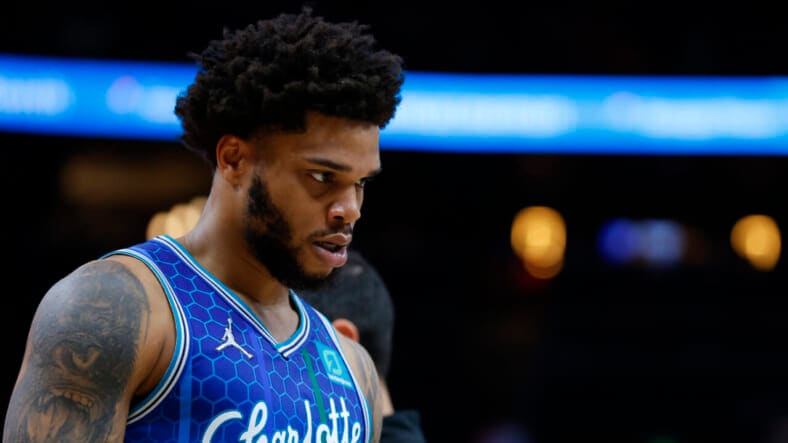When it comes to domestic violence, sports leagues need to do more

By DERON SNYDER (as published by theGrio)
Something about Mychelle Johnson hit different when I saw her Instagram post with the injuries and the medical report and the video of her young son, eating a popsicle on FaceTime telling someone “Daddy choked Mommy.”
According to the National Coalition Against Domestic Violence, one in four U.S. women suffer severe intimate physical violence. But the vast majority don’t break through the news cycle like Johnson, whose husband is a 6-foot-7, 225-pound NBA player. If Miles Bridges were an anonymous office worker or independent contractor with a side hustle, we’d hear nothing of Johnson. Wouldn’t know she exists.
But Bridges, 24, is a baller, meaning family affairs become instant news when arrests are involved. A restricted free agent who played for Charlotte the last four seasons, he was charged with felony domestic violence on June 29 and released on $130,000 bond. His court date is set for July 20.
Based on his wife’s lengthy post, he’s gonna need a lot of nerve to say not guilty.
I’m uncertain why Johnson’s account of domestic abuse resonates so deeply, opposed to other equally tragic ordeals. Any of these women could be my daughter or sister, my niece or cousin. Johnson’s pictures are heartbreaking but it’s her writing that pricks raw emotion. The layered pain is evident through her transparency and vulnerability, which she shares bravely and reluctantly.
“I hate that it has come to this but I can’t be silent anymore,” she begins. “I’ve allowed someone to destroy my home, abuse me in every way possible, and traumatize our kids for life.”
Her husband was a coveted free agent and the Hornets were prepared to fend off suitors a few days ago. “We’re going to bring him back,” GM Mitch Kupchak told reporters. “He’s been great for the franchise, and I believe with his work ethic, he’s only going to get better.”
Now, there are reports that Charlotte’s intentions might’ve changed. Mine certainly would. Though Bridges will likely play in the NBA again, I wouldn’t bring him back. He can start fresh somewhere else, after serving any potential punishment.
Kupchak and the whole organization should ask a different question, not whether Bridges should return, but “did we overlook any signs of this?” Johnson said other people knew and sided with the player. Team employees in that category needn’t return to the facility, either.
“I won’t allow the people around him to continue to silence me and continue to lie to protect this person,” Johnson wrote. “It’s unethical, it’s immoral, it’s truly SICK. It hurts my heart because I’ve always had hope, and so much love and as scary as this is for me to do it’s time I stand up for myself.”
Every men’s professional sports association needs to join her and other victims. Stand shoulder-to-shoulder with them. It’s the right thing to do and a counter to stereotypical jock behavior in media and pop culture. “Athletes are not more violent than non-athletes,” writes Mitch Abrams, author of Anger Management in Sport: Understanding and Controlling Violence in Athletes. “Athletes are human. Many people in society struggle with anger, and some athletes do as well.”
But there’s no denying that many men idolize athletes in the NBA, NFL, and other sports leagues. It’s past time for these organizations to do more than issue stale statements from a timeworn template when incidents occur, then sit back and wait for the next time.
I want a heavy rotation of ads and public service announcements featuring fully vetted athletes who are legitimately disgusted by domestic violence. The high-profile campaign should run year-round, during every game of every major sport, with increased frequency during the postseason. Networks can make room by forsaking some gambling commercials and military ads; make these vital messages more ubiquitous than Jake from State Farm and Lily from AT&T.
Surely a concerted effort might prevent at least a few women from being beaten – or worse.
Athletes from across all sports can be the loudest voices in the fight against domestic violence, encouraging enablers to quit and abusers to change – teammates included. Perhaps some advocates can speak from personal experience about relatives or acquaintances who are survivors. The athletes can also highlight resources to help batterers control their anger and refrain from violence. Johnson said she was led to post after her two young children saw her suffer the injuries.
“I don’t need sympathy, I just don’t want this happening to anyone else,” she wrote. “I just want this person to get help, my kids deserve better. That’s all I want.”
Since sports captivates a significant portion of the male demographic, athletes have the perfect stage and audience to hopefully make a difference. All that’s missing is the tagline:
REAL men don’t do domestic violence.
 Follow
Follow
